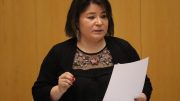An educator in Fort Simpson has found moving her language lessons online a necessary and important step in ensuring her students keep up with their language education.
Sharon Allen, an educator at the Líídlįį Kúę high school in Fort Simpson, said her decision to start an online page for her Dene Zhatié class for junior high students became necessary because her school district did not include her class in the list of “core courses” when deciding on which courses received funding for learning kits.
So she created a Facebook group to keep her lessons going.
As a fluent speaker and writer in the Dene Zhatié language, she felt it was necessary to ensure her students maintained the progress they made in the classroom, although she admits, with the pandemic, it’s hard to judge a student’s progress because not everyone has access to the internet.
“The senior students have an easier time reporting back, because they generally have better access to the internet, while the junior students don’t,” she said.
“I think it’s necessary to continue our Indigenous languages because the numbers have proven the languages are on the decline and not a lot of people speak in the home,” she said. “I think it’s important that we continue moving forward with education, no matter whether it’s core courses or the language. To me, it’s important because it’s part of our identity.”
Like so many others, she’s required to stay at home. But that hasn’t stopped her from creating language lessons. She creates paper packages that require her 23 students to identify colours, numbers, as well as everyday objects and situations in their language.
“I try not to put too much English into the packages,” she said, adding that by introducing their language slowly to her students, it’s easier for them to advance in their learning. But for her, it’s not the same as delivering the same lessons in the classroom.
“I really miss being in the classroom, because it’s different. You get to hang out with different personalities, you get to see the facial expressions, whether they’re getting it or if they’re frustrated. This is a really different kind of way of educating. Online you’re not getting feedback. If people are able to write back in the language that helps a lot. But giving a lot of the materials to the students on paper and reinforcing that material online, hoping they’re able to connect the dots.”
So, unless the rules governing social distancing and the manner in which lessons in the core courses are eased, this is how Allen will continue to deliver her language lessons. One package at a time.
Despite the challenge however, she’s encouraged that several students are becoming more articulate in their language.
“We’ve moved slowly through the packages into the written portion of our course. The packages are reviews of the colours and number and simple things, simple phrases.”
And for Allen, knowing her students are still progressing despite the social distancing rules is reason enough to celebrate their culture.
“I love teaching my language, I’m able to do it and I am home anyway so I just figured I’d take the courses online.”









